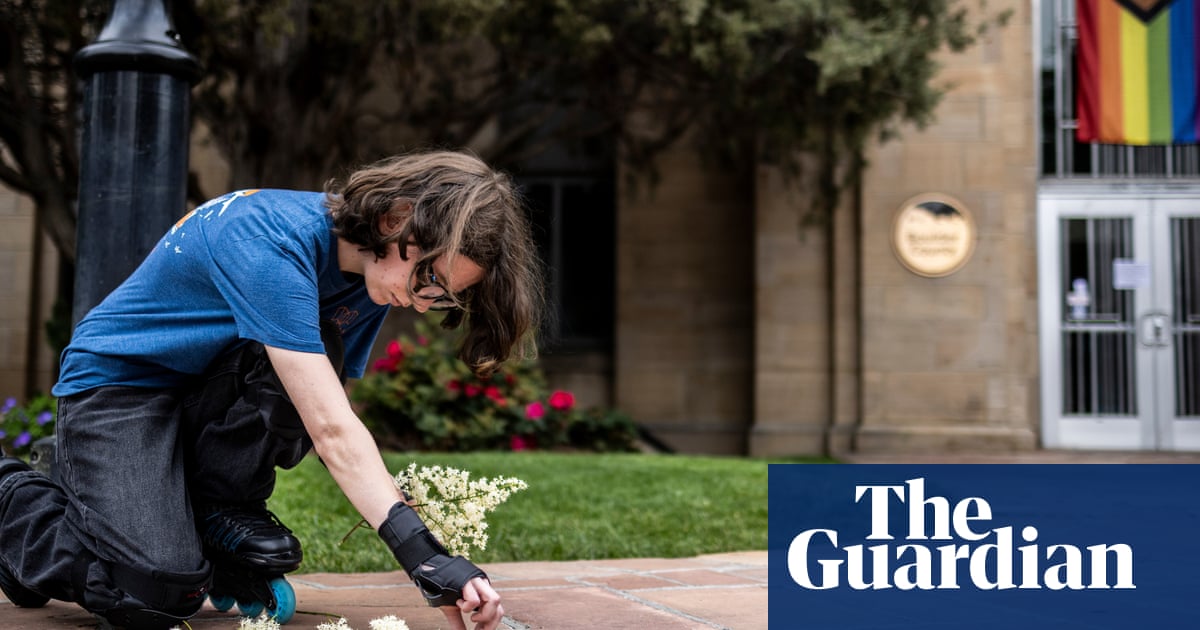The man accused of attacking a a pro-Israel peace parade with molotov cocktails inBoulder, Colorado,on Sunday told authorities he planned to use a gun and took a concealed firearm class – but was denied the purchase because he was not a US citizen.
Mohamed Sabry Soliman, an Egyptian national, is facing federal and state charges over the attack which wounded 12 people as they held a weekly demonstration calling for the release of Israeli hostages inGaza. He had planned to target the demonstration with 18 molotov cocktails in his possession but apparently had second thoughts and threw just two, according to authorities.
In what the FBI has called a “targeted terror attack”, Soliman yelled: “Free Palestine,” police wrote in an affidavit. Police said Soliman abandoned his full plan “because he got scared and had never hurt anyone before”.
Soliman, 45, is facing 16 state counts of attempted murder, 18 others related to the use of an incendiary device, and a federal hate crime charge. The FBI said he also used a makeshift flamethrower against the demonstrators.
In court papers charging him with a federal hate crime, authorities said he expressed no regrets about the attack and specifically targeted what he described as a “Zionist group”. Soliman had planned the attack for more than a year, authorities allege.
“When he was interviewed about the attack, he said he wanted them all to die, he had no regrets and he would go back and do it again,” J Bishop Grewell, the acting US attorney for the district of Colorado, said during a news conference on Monday.An FBI affidavit said Soliman told the police he was driven by a desire “to kill all Zionist people” – a reference to the movement to establish and protect a Jewish state in Israel.
Authorities’ affidavit said the molotov cocktails were made up of glass wine carafe bottles or jars with clear liquid and red rags hanging out of them and he also carried gasoline in a commercial-grade, backpack weed sprayer. Soliman allegedly told investigators he planned to use the weed sprayer to burn himself to death and “would never forgive himself if he did not do it”, as the Wall Street Journalreported.
“He stated that he … was waiting until after his daughter graduated to conduct the attack,” said the affidavit, which added that investigators believe Soliman acted alone.
As of Tuesday, Soliman was being held on a $10m, cash-only bond, prosecutors said. His next court hearing is tentatively set for Thursday.
Soliman had been living in the US on an expired B-2 visitor visa for more than two years after entering the country in August 2022, according to the Department of Homeland Security assistant secretaryTricia McLaughlin in a post on X.
He moved to Colorado Springs three years ago, where he lived with his wife and five children, according to state court documents. He previously spent 17 years living in Kuwait.Soliman worked as an Uber driver and had passed the company’s eligibility requirements, which include a criminal background check, according to a spokesperson for the ride-share service. An online résumé also says he was employed by a Denver-area healthcare company working in accounting and stock inventory control.
Authorities said that the victims wounded in the attack ranged in age from 52 to 88, and their injuries spanned from serious to minor. Six of the injured were taken to hospitals, and four have since been released, according to the organization of the targeted demonstration, the Denver-based, pro-Israel group Run for Their Lives.
Witness Alex Osante of San Diego, who filmed the aftermath of the attack, said Soliman evidently set himself on fire as he threw the second molotov cocktail and had removed his shirt to reveal what appeared to be a bulletproof vest.
Soliman was arrested without any apparent resistance, according to the video Osante filmed. Authorities said Soliman was injured and taken to a hospital but did not elaborate on his injuries. A booking photo showed him with a bandage over one ear.
The attack at the popular Pearl Street pedestrian mall in downtown Boulder comes amid rising tensions over the Israel-Hamas war that has contributed to an increase in antisemitic violence in the US.
It comes nearly two weeks after a man was charged with fatally shooting two Israeli embassy staffers outside a Jewish museum in Washington. As police arrested him, the suspect in that attack, identified as 31-year-old Elias Rodriguez, yelled: “I did this forGaza. Free Palestine. There’s only one solution, intifada revolution.”
In April, a man set fire to the residence of Pennsylvania’s governor, Josh Shapiro, who is Jewish. The suspect later said the fire was a response to Israeli attacks on Palestinians.
Rabbi Yisroel and Leah Wilhelm, directors of the Rohr Chabad House at Boulder’s University of Colorado, said in a statement that they had received “an immense wave of positive messages” after the attack. They said that was “another signal of the health and strong spirits of our community”.
